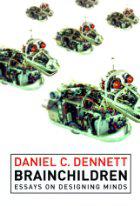
NEWS: Chatbots.org survey on 3000 US and UK consumers shows it is time for chatbot integration in customer service!read more..
Brainchildren
Essays on Designing Minds

Amazon.com Review
One of the movers and shakers in the rapidly converging fields of cognitive science, philosophy of the mind, and cognitive ethology, Daniel C. Dennett is also one of the most popular and engaging expositors of science writing of the 1990s. The essays in Brainchildren will therefore be of interest not only to specialists but to the general reader as well. It is especially convenient to have these essays collected in one volume, as most of them appeared originally in relatively inaccessible publications.
Much of Brainchildren defends and expands views that Dennett advanced elsewhere, particularly in his 1991 magnum opus, Consciousness Explained. The most noteworthy of these is the essay “Real Patterns,” in which he locates his “mildly realistic” view of the ontology of beliefs (and other mental items) in relation to the views of Jerry Fodor, Donald Davidson, Richard Rorty, and Paul Churchland. Dennett comments, quite correctly, that “Real Patterns” is utterly central to his thinking; nobody interested in his work should neglect it. Less central but more controversial is “Speaking for Our Selves,” coauthored with the psychologist Nicholas Humphrey, which argues that Dennett’s view of the self neatly accommodates the possibility of the dubious phenomenon of multiple personality disorder. Also included is a handful of book reviews, forewords, commentaries, and other occasional pieces that will perhaps be of only limited interest to the nonspecialist. But Dennett provides enough philosophical and psychological excitement in Brainchildren to thrill even the casual reader.—Glenn Branch
New Comment
Only registered members are allowed to comment. or login
or login
